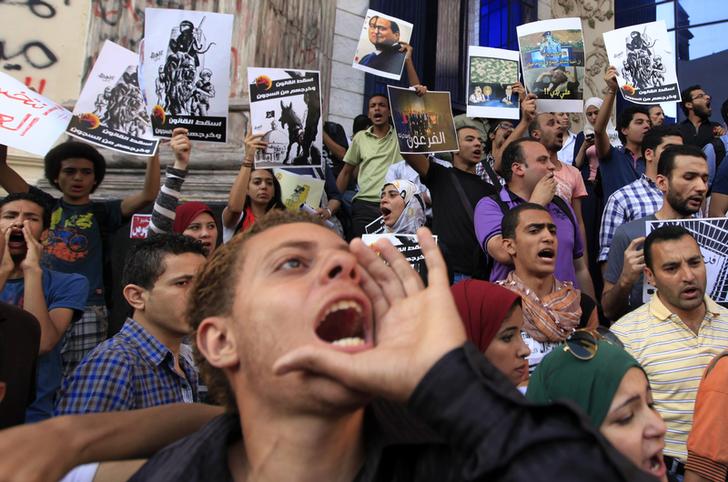 A former Muslim Brotherhood leader has warned that government oppression in Egypt is fanning militancy that will pose a threat abroad unless the army-backed authorities start respecting freedom and human rights.
A former Muslim Brotherhood leader has warned that government oppression in Egypt is fanning militancy that will pose a threat abroad unless the army-backed authorities start respecting freedom and human rights.Abdel Moneim Abol Fotouh, who left the Brotherhood in 2011, said that once former army chief Abdel Fattah al-Sisi wins a presidential election this week - as is widely expected - he had two choices: restoreEgypt's path to democracy, or risk more instability that will dash hopes for economic development.
In an interview with Reuters, Abol Fotouh predicted wider consequences flowing from the crackdown launched last year after the military overthrew the Muslim Brotherhood's Mohamed Mursi, Egypt's first democratically-elected president.
He noted, for example, how past oppression in the Middle East had bred radicalism of the type that led to the Sept. 11, 2001 attacks on the United States.
"The world around us must recognise that it will not be stable unlessEgypt is stable, and what is going on now is producing terrorism for which Egyptians are paying the price, and for which the world will pay the price," he said in the interview, which was conducted on May 21.
The security forces killed hundreds of Mursi's supporters and jailed thousands more after his removal from power. Members of secular pro-democracy groups have also been jailed.
The state, claiming a popular mandate for crushing the Brotherhood, says it is in a war against Islamist militants who have killed several hundred members of the security forces in bombings and shootings that followed Mursi's removal.
Abol Fotouh said the government was using that fight to repress legitimate political opposition, including the Brotherhood which denies that it has turned to violence.
This contrasted to tactics used by autocrat Hosni Mubarak, who was overthrown in a popular uprising in 2011. "Hosni Mubarak didn't do this. He repressed the politicians on one hand, and the terrorist groups on the other," said Abol Fotouh. "The current regime is mixing them all together."
"This regime is generating terrorism. If this oppression and injustice does not stop, the base of terrorism will expand."
The long struggle between the Egyptian state and the Islamists played a part in the evolution of militant Islam in its present form. Some of the Islamists who suffered during the suppression of the Muslim Brotherhood under President Gamal Abdel Nasser, starting in the 1950s, and his successors contributed to the rise of radicalism.
Al Qaeda leader Ayman al-Zawahri came from Egypt. So did Mohamed Atta, one of the leaders of the Sept. 11 attacks. Abol Fotouh and Zawahri spent time in adjoining jail cells in 1981.
"THE INJUSTICES MUST STOP"
Abol Fotouh, who was bitterly at odds with the Brotherhood's current leadership, presented himself as a moderate centrist in his 2012 bid for the presidency. He came fourth.
The 62-year old doctor was an opponent of Mursi's rule and called for the protests that led to his downfall, though he had sought early elections. He also opposed the army's decision to unseat the elected president, who is now on trial.
The state has declared the Brotherhood a terrorist group.
Abol Fotouh said all Egyptians backed the fight against militants, but the "Brotherhood was no terrorist organisation", and the same applied to secular groups also being repressed.
Abol Fotouh estimated the number of detainees at 25,000.
Listing examples of recent injustices, he cited a court that had sentenced about 1,200 Brotherhood members and supporters to death "as if they were chickens" after trials criticised as grossly unfair by human rights groups.
"The injustices must stop," he said. "You cannot find an Egyptian village, or institution, or district, or person that has not had a friend or relative killed, jailed or wounded."
"There is no option for any government in Egypt other than to bring about national reconciliation," he said.
While the Brotherhood says it remains committed to peaceful activism, members say it is struggling to contain the anger of its youth base. Many of the attacks on the police and army have been claimed by radicals espousing the ideas of al Qaeda.
Abol Fotouh said he had tried to promote reconciliation between the Brotherhood and the army, but neither had the will.
He said Sisi had been Egypt's de facto leader since last July, but did not want to prejudge his presidency.
"We want Egypt to turn into a productive country, with good education, and health ... for factories to work, .. but this can only happen in an atmosphere of freedom, where there is respect for human rights, and justice," he said.
"Sisi has no other path. He either chooses the path of destroying the nation with oppression and terrorism and so on, or he chooses the path of respecting rights and freedoms."



